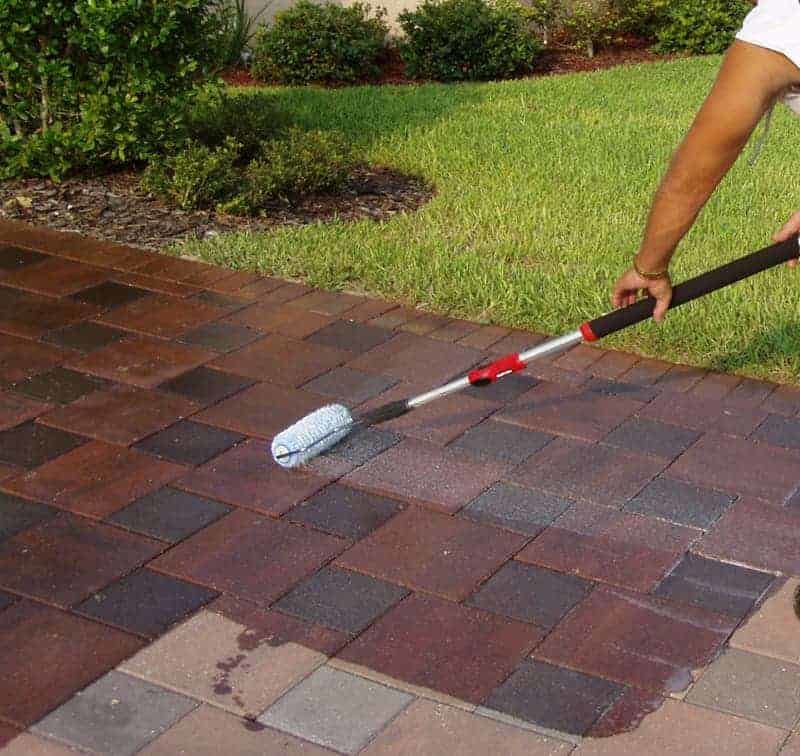Some Known Factual Statements About Paver Sealing In College Park Fl
Table of ContentsThe Single Strategy To Use For Paver Sealing In College Park FlThe smart Trick of Paver Sealing In College Park Fl That Nobody is Talking AboutNot known Facts About Paver Sealing In College Park FlRumored Buzz on Paver Sealing In College Park Fl
For the first day, the pavers or concrete are being treated with a variety of chemicals and options. The next process is pressure cleansing which is being done sensibly. The next day, when the concrete or pavement is entirely dry and cleaned up, the coating is then used. Specialists recommend that lorries and heavy-duty equipment should not be driven over a covered paver for about 48-72 hours.
Efflorescence appears on top of the concrete leaving a powder-like look or something understood as "white haze". When this happens, it indicates you have utilized a permeating paver sealer on the pavers while it perspired. What you require to do is to strip the finishing off the pavement to eliminate the white stuff.
Hence, you ought to read the paver sealer examines carefully before selecting the sealant for your surface area. You should keep in mind all the qualities that a sealer requires to have and after that choose appropriately. , we begin utilizing an industrial grade surface cleaner that has a turning bar with 2 spray ideas. This runs at 3500-4000 psi and will completely scrub the pavers and paver joints without causing damage. We then "cross wash" the paver location again, so it gets "double scrubbed" to ensure they're tidy, and to assist eliminate algae accumulation or dirty sand between the paver joints.
Unknown Facts About Paver Sealing In College Park Fl
We then utilize a wand to pressure wash around all edges, corners, columns, etc. Swimming pool locations likewise get detailed around the pool screen, pool coping, hot tubs, and other water functions. The wand helps eliminate paint areas, mortar, grease, and more from the surface of your pavers. 3. After the washing procedure, we thouroughly rinse all dirt and debris from the paver location.
Once the pavers are cleaned up and rinsed thoroughly, we can then see the actual condition of the pavers, get rid of additional discolorations, etc. Some paver systems require our special where the paver joints are flooded with our algaecide/ sodium hypochlorite mixture and enabled to dwell, which will assist eliminate extra mold and weeds between paver joints and under the paver system.
After the appropriate dwell time, we then rinse all pavers again before beginning the resanding procedure. 4. action in the remediation procedure, over at this website as the sand supplies the stability of your whole paver system. We use a coarse-grained, washed silica sand and fill to within find more roughly 1/8" of the paver edge utilizing the "damp sanding" approach.
5. As soon as the sanding of the paver joints is complete, we utilize a blower to blow any excess sand off the pavers before using the sealer. 6. The first coat of sealant to be used in our sealing procedure is called a "flood coat". The paver joints and surface of the pavers are actually flooded with sealant to make sure the sand soaks up the sealer, and that the paver itself gets soaked to create the barrier in between your pavers and the components - Paver Sealing in College Park FL.
6 Simple Techniques For Paver Sealing In College Park Fl
Flooding the paver joints locks in the sand, and will help prevent great deals of problems with your paver system in the future - Paver Sealing in College Park FL. 7. A 2nd and 3rd coat, or "top coats" of sealant is also applied to assist form the protective barrier your pavers need, and to deliver more sealant to the paver joints.
After the sealant completely cures, the sand will be completely locked into the paver joints, colors enhnaced, and long-lasting defense against the elements. We provide extra coats of sealer too. After the sealer is applied, we utilize a more info here backpack blower to assist disperse excess sealant and to assist recoat the paver surface.
For driveways, we make certain that all dirt and debris is washed from sidewalks and curb locations. suggests waiting 24 hr to return furnishings to patio areas, and 48 hours before driving automobiles on driveways or paver roadways. Learn more about Seal 'n Lock Paver Sealing Products Here.
The finest paver sealants help lock stones in place, limitation disintegration inside joints, ward off discolorations, and keep the pavers looking their best. Sealers cure to a variety of surfaces, consisting of wet or high-gloss, matte, or satin. By penetrating deep and filling pores, holes, and crevices, paver sealants secure the substrate product while avoiding dirt, bugs, or other particles from settling into the stone or brick.
Top Guidelines Of Paver Sealing In College Park Fl
Paver sealants assist keep paver stones looking brand-new. They likewise offer fringe benefits, consisting of inhibiting moss, weeds, and lawn from growing inside the joints; loss of sand from the joints; and obstructing spots, such as grease, oil, or gas. The very best paver sealants also assist safeguard against expensive and unappealing damage and degeneration.
The kind of paver sealer chosen depends on the factor for sealing. paver sealants provide substantial security, frequently lasting longer than their film-forming counterparts. They treat to a matte finish - Paver Sealing in College Park FL. paver sealers provide more detailed defense by developing a physical barrier on top of the paver. Film-forming sealants, which come in satin, gloss, and semi-gloss finishes, require more frequent reapplications.